QUEBEC, Canada (VN) — “It’s changing racing and not in a good way.”
That’s Michael Matthews, the Australian star on BikeExchange-Jayco, addressing how the UCI relegation war is impacting the elite men’s WorldTour racing.
Going into the closing weeks of the 2022 season, a half-dozen teams are in a desperate struggle for WorldTour survival as the deadline approaches to accumulate points in order secure a spot in the top league for the next three years.
As Matthews pointed out, strange things are happening inside the racing in the waning weeks of the relegation war.
Speaking to VeloNews during the recent WorldTour races in Canada, sport directors, managers, and riders across the peloton shared insights and pointed out how racing is being distorted by the desperate chase for points.
“Instead of racing to win,” one WorldTour sport director told VeloNews, “we are racing to prevent our rivals from winning. It’s against everything our sport should be.”
Here are a few examples of how the relegation struggle is impacting racing:
- During the Vuelta a España, teams were refusing to help chase down breakaways for fear that a rival relegation team could later get points.
- Riders heading from one team in relegation danger to another team in relegation zone are sandbagging on Team A so that Team B will have a better chance to be in the WorldTour next year.
- Sport directors are ordering riders to mark relegation rivals, not to win, but to lose as few points as possible.
- Teams are sending sick riders to race in order to chase results, putting points before health.
- Teams on the relegation bubble are racing more often and putting riders and staffers under duress
Those are just a few examples of how racing is changing with teams facing possible closure if they cannot secure WorldTour licenses for the next three seasons.
Sylvan Adams, the outspoken owner of Israel Premier Tech whose team is on the relegation bubble, is even more blunt.
Adams said the UCI’s relegation system — which will guarantee a WorldTour license for the top-18 ranked teams from 2023-25 — could mean the end of any team not retaining its top-tier status.
“Relegation is death. It doesn’t matter which of the two teams end up being relegated. It’s an existential problem,” Adams said. “Why are we destroying rather than building? It’s as simple as that. I hope that common sense prevails.”
Time is running out. The 2022 season ends with the Tour of Langkawi.
Teams are shaking their collective heads at the absurdity of the points chase.
The Malaysian race could see its best field ever as teams on the bubble will be sending their A-listers to a race in Southeast Asia in a final-hour bid to secure millions of dollars in future sponsorship funding.
Relegation could mean closure of teams not making the cull
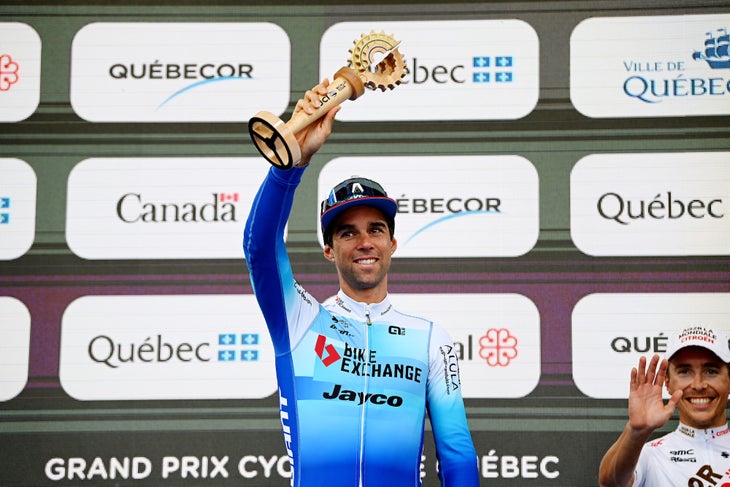
Going into the final month of the 2022 season, there are at least seven teams on the bubble. Among those, two will not race in the WorldTour for the next three years.
No big deal, right? Especially when the two top-ranked non-WorldTour teams based on 2022 points will receive automatic invitations to all WorldTour races, just as Alpecin-Deceuninck did in 2022.
The WorldTour status, however, has two critical underpinnings for teams.
First, it guarantees a spot in the Tour de France, the race that remains the gravitational center of the cycling universe.
And second, WorldTour status is often the financial linchpin for the multimillion dollar budgets, with sponsorship deals and rider contracts dependent on WorldTour status.
Without WorldTour status, things can quickly unravel for a team left on the outside.
Managers confirm that nearly every team has all their major sponsorship and equipment contracts linked directly to WorldTour status. Rider contracts often have escape clauses for top riders if a team loses WorldTour status.
“It might not be the end of our team if we lose the WorldTour, but it would make things very, very difficult,” one manager said. “Riders will leave, bike sponsors will leave. Not much will be left.”
There’s at least one long-running team that could lose its entire sponsorship if it does not retain its WorldTour status. Others have expressed worry as well.
Also read:
- UCI confirms relegation rules will be enforced
- Spain having trouble filling out worlds team
- Enric Mas on UCI points: ‘We don’t talk about it among the riders’
So with the stakes so high, teams are asking riders to do some crazy things.
Insiders grumble that staffers and riders are stressed.
Everyone is being pushed to the absolute limit in terms of racing, recovery, travel, and performance. Riders have gone straight from the Tour de France, to races, to altitude camps, and more races, just to chase points.
Who’s in, who could be out?
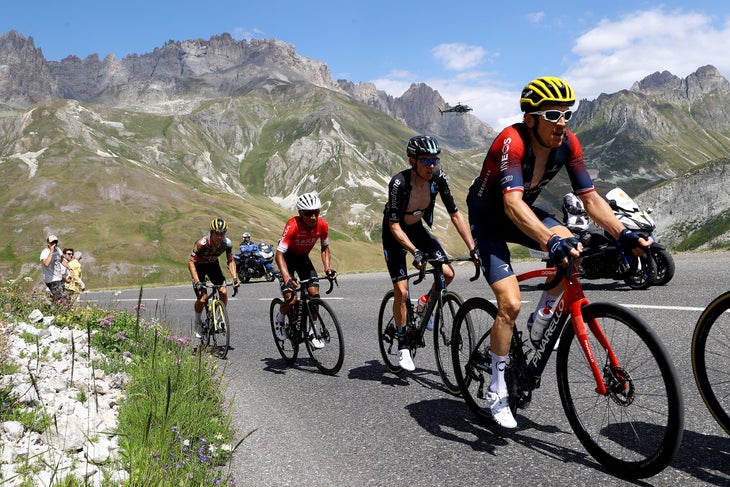
Alpecin-Deceuninck, all but a WorldTour squad in budget and performance, is sure to make the grade currently ranked safely in the top-10.
Arkéa-Samsic suddenly finds itself closer to the relegation bubble after Nairo Quintana’s Tour disqualification based on his use of Tramadol, charges that the Colombian is challenging. The points earned during the Tour were scrubbed from the team’s running tally.
Long-running franchises EF Education-EasyPost, BikeExchange-Jayco, Movistar, Cofidis, Lotto-Soudal, and Israel Premier Tech are all fighting for the final spots.
Also read: Matthews racing for glory and salvation as season winds down
Two of the above teams will not receive WorldTour status, at least according to the rules.
Lotto-Soudal and Israel Premier Tech look to be most likely to be relegated, but things are going down to the wire.
The irony is that the UCI has shot itself in its own foot with the points-inspired Frankenstein experiment.
Several teams are not releasing their top riders to race the world championships in order to send them to races in Italy, France, and Belgium in the next few weeks that no one’s ever heard of.
Why? To chase points.
Alejandro Valverde, the 2018 world champion, won’t be going to what would be his final worlds because Movistar needs him to race elsewhere in events that he can harvest points in the closing days of his 20-year career.
The road cycling world championships are the cycling governing body’s marquee event, where it earns millions of dollars each year, and where the prestige hangs on the shoulders of the rainbow jersey.
But in 2022, there will be a half dozen teams who will not release their riders to race the worlds because of points. Will rainbow jersey lose some of its luster?
Probabilities of UCI WorldTour relegation:
Israel – Premier Tech: 93.4%
Lotto Soudal: 32.2%
BikeExchange – Jayco: 29.8%
Cofidis: 27.8%
EF Education – EasyPost: 9.7%
Arkéa – Samsic: 5.9%
Movistar: 1.1%*Predictive model based on each team’s schedule and 100000 simulations.
— Raúl Banqueri (@raulbanqueri) September 12, 2022
The points system ‘makes no sense’
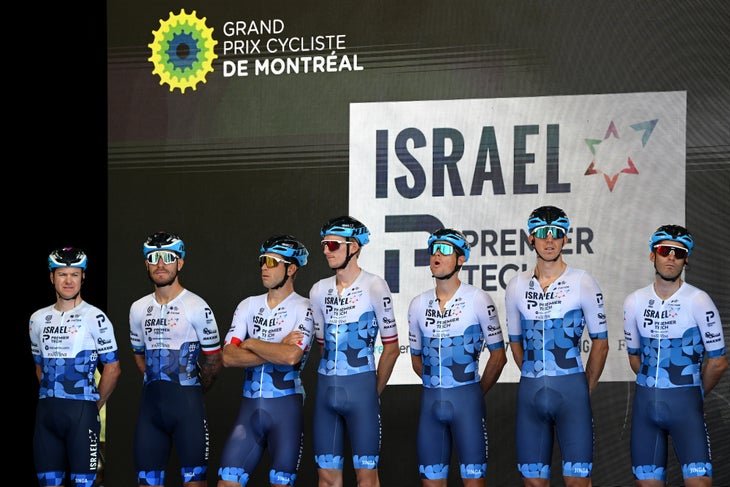
Teams are pulling riders from WorldTour races and sending them to race in minor races across the calendar in hopes of cherry-picking some easy points.
As one DS put it, it’s like playing in soccer’s UEFA Champions League, but midway through the season, a team can play in the third division, score a bundle of goals, and have those points count in the Champions League standings.
“This is not the best teams racing in the best races,” the director said. “This is something strange where teams are hunting points at the smallest races so they can be in the biggest races later. It makes no sense.”
Also read: Sylvan Adams threatens lawsuit if team loses WorldTour status
Teams grumble that points across several levels of UCI-ranked races are being used to tally the WorldTour score card.
Managers are exasperated that a podium spot a middle-tier, one-day race can be as much or more than winning a stage at the Tour de France or finishing in the top-10 at a grand tour.
Some standing on the sidelines only mock the teams’ desperate straits, pointing out that they’ve known the rules would be in place during the past three seasons. In fact, all the major stakeholders signed off on the agreement in 2018 via the Professional Cycling Council (PCC).
Also read: Outer Line examines the points system
And some hold up Arkéa-Samsic as an example of how a team on a limited budget hacked the UCI relegation/promotion game by targeting small-time races across three seasons to bank what looks to be their WorldTour ticket.
And if Arkéa-Samsic does hit the WorldTour in 2023, will have it have to simply repeat its template of racing minor races to score points to retain its license?
Unless it sees a big budget increase and can sign better and more riders, it almost certainly will.
“We are not racing to win, we are racing to limit our point losses,” another sport director said. “It’s insane, and everyone is doing it.”
Teams on the bubble also say they were fully aware of the rules and the points system, but they had faith that if they stayed true to their sporting principals that the wins would come.
COVID-19 hasn’t helped, and the skewed points system is favoring classics teams over GC teams.
Teams such as EF, BikeExchange and Movistar proudly hang their banners on stage racing and stage hunting, and they’re the ones facing the worst pinch. That’s not to say those teams don’t race the classics and monuments without success, but their collective DNA is GC.
Yet those teams and others are exasperated at how 10th place in the Tour de France — a race that riders sacrifice and train for six months to be at the top of their game in the event that is pinnacle of professional cycling — earns less in points than winning the Maryland Cycling Classic, a new one-day race in the United States that featured only four WorldTour teams, of which three of those are facing relegation.
One sports director even welled up in tears as he recounted how stressed out and worried his staff of soigneurs, mechanics, and other staffers are.
COVID-19 continues to hit teams well into the third year of the season.
Israel Premier Tech saw only one rider finish Paris-Nice in March, and it couldn’t even field a squad at the Tour of Flanders because so many of its riders got sick. More riders left the Vuelta this year citing COVID-19 than in any grand tour in the past 36 months.
ProCyclingStats analyzed data to reveal that teams on the relegation bubble are racing more race days this season compared to last season, further stressing riders and staffers.
A peloton at two budgetary speeds
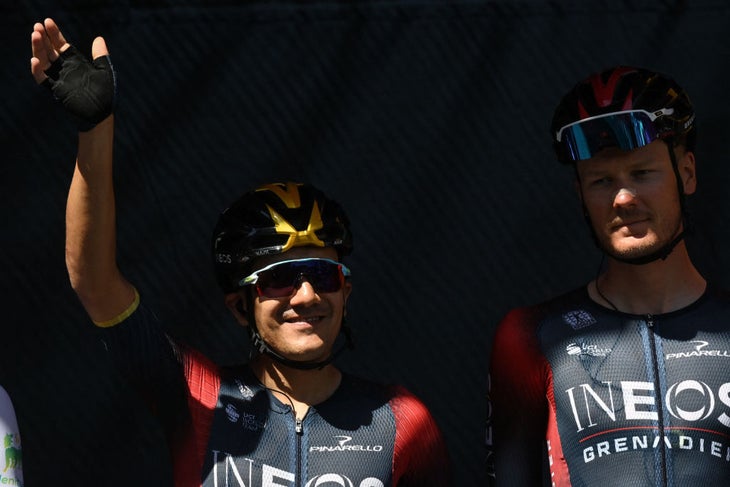
There are fans and some within cycling’s inner circle that think that the promotion/relegation idea is a good one.
Even recognizing the seemingly unfair points system and the backdrop of a world pandemic, backers counter that it “was the same for everyone.”
And they point out that every team’s known about this for three years, and that no one seemed too concerned about it until the past few months.
Yet all the teams on the edge of relegation also share one more trait — budget constraints.
Only Arkéa-Samsic — which operates on a relatively thin budget, has been able to exploit its schedule heavy on French Cup races to scoop up big points at low-ranked races — defies the narrative that the rich are getting richer at the WorldTour.
Other teams on the cusp of losing their WorldTour licenses all operate on budgets that are dramatically smaller than the teams at the top of WorldTour hierarchy.
WorldTour leader Ineos Grenadiers enjoys a budget estimated at 50 million pounds, while some murmur that UAE Team Emirates doesn’t even have a budget. Tour de France winner Jumbo-Visma is estimated to top 40 million euros per season.
Also read: Should cycling introduce an NFL-style salary cap?
The teams fighting for WorldTour salvation all operate on about half that or less to try to battle with the richest teams.
“We cannot compete with the big-budget teams when it comes to recruiting,” one manager said. “They can snap up the best young riders and pay big salaries to attract the top riders. There’s not much left over for everyone else.”
That financial imbalance plays out in the races.
A squad like Ineos Grenadiers can bring multiple leaders to every race on the calendar, so if one their top riders falls ill or crashes out — Egan Bernal is the perfect example — they have plenty of quality to fill out the loss.
The UK team finished second in the Giro, third in the Tour, and seventh in the Vuelta even with crashes and illnesses taking its collective toll because it has the budget and depth of its roster to bring multiple leaders to every race.
In contrast, a team which has one marquee rider, if that rider is out of racing, the team isn’t earning many points in their absence simply because they don’t have others capable of stepping up to fill the void in the GC hierarchy.
Team rankings are based on the top-10 riders on the UCI ranking, so that’s why it was devastating for Arkéa-Samsic to lose all the Tour points acquired by Quintana because he earned so many during July. Now the team is dropping fast in the closing weeks of the season.
So it’s no surprise that the teams at the bottom of the WorldTour relegation/promotion ranking have about one half of the points of the teams at the top, mirroring the harsh reality that a peloton without salary caps or budget guardrails leads to a peloton at two budgetary speeds.
So far, teams on the relegation bubble might be racing negatively against one another, but there’s no evidence that the “safe” teams are tipping the scales in favor of any one team facing oblivion.
In fact, the peloton’s wealthiest teams are still winning as if their respective futures depend on points.
Also read: UCI’s WorldTour means nothing and everything all at once
At the top of the board, Jumbo-Visma, Ineos Grenadiers and UAE Team Emirates are also in a fight to win the WorldTour season title, with Ineos Grenadiers reportedly holding back riders from the worlds to chase points so it can try to overtake Jumbo-Visma for the end-of-season bragging rights.
At Sunday’s Grand Prix Cycliste de Montréal, Tadej Pogačar beat Wout van Aert, with Adam Yates finishing fourth, meaning that the peloton three richest teams ate up the most points on offer.
The highest-ranked rider on a relegation bubble team Sunday was Warren Barguil in 1oth for Arkéa-Samsic. Matthews of BikeExchange-Jayco was 13th and Sep Vanmarcke was 15th for Israel Premier Tech.
Teams facing relegation lament that some of their “safe” rivals are not stepping up to defend their interests and cited a lack of solidarity among the WorldTour teams.
It’s hard times for teams racing on fumes.
UCI sticking to its guns
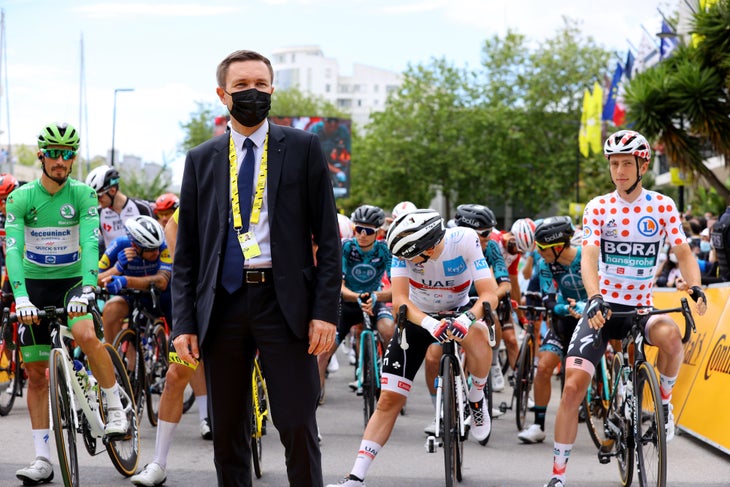
Last week, the UCI pushed back on reports that it was considering to toss out its relegation system, and allow 20 teams to race in the WorldTour.
In a tersely worded press release, it said the next round of WorldTour licenses will be based on team points ranking.
Some are wondering why the UCI is being so stern. The WorldTour used to be 20 teams, and no one complained too much. In fact, the WorldTour was rolled back to 18 in part because there were only 18 teams that met the financial demands or wanted WorldTour status a few years ago.
Before this summer of discontent, points were an afterthought. No one spoke about them, and team rankings were anecdotal. Now it’s a question of absolute survival of an entire franchise, with the jobs of 30 riders and 40 support staffers hanging in the balance.
Also read: Former UCI president against relegation idea
Why is this happening? No one can seem to get a straight bead on that.
There are whispers of a French conspiracy to protect and defend French racing against an ever more international peloton.
Former UCI president Pat McQuaid told VeloNews in an interview earlier this year that Tour de France owners ASO was always pushing to reduce the power of teams, and that the idea of relegation/promotion was always one of its favored agenda items.
Some who support the notion of relegation relish the fact that there is a new end-of-season narrative and that every point matters. Proponents say it’s pumped new interest into lower-tier races as teams chase desperately needed points.
The UCI cited “sporting” criteria for its rationale why it pushed the relegation/promotion idea through the UCI Congress in 2018, insisting that it reflects the “European model” akin to Europe’s soccer leagues rather than the “American model” of permanent franchises.
Detractors argue that the desperate chase for points is creating the antithesis of what the elite of the sport should be.
Instead of the best riders from the best teams in the best races, it’s now about teams searching out the lower-tier races to race against weaker fields to harvest the maximum points.
The distortions in racing during the past few months are proof of that.
Some are hoping the UCI will not follow through with its relegation cull, especially with many complaining that the past three seasons have been contested under extreme conditions of the coronavirus pandemic.
Many are campaigning to return the WorldTour to 20 teams, thus solving a problem that doesn’t really need to exist, at least in the minds of some.
Adams publicly raised the issue last week, calling for the UCI to cite “force majeure” in light of the world pandemic and simply expand the WorldTour from 18 to 20 teams going into 2023.
“Who is hurt by this idea of going to 20 teams? Nobody,” Adams said. “This is a very elegant solution; expand to 20 teams, and nobody loses.”
There’s also growing concern that the existential threat to entire teams will push the peloton back toward another type of desperation.
Some worry that the specter of large-scale doping, which many observers say has been pushed out of the sport during the past decade, could come rearing back.
“I’ve seen riders dope to win races, and I’ve seen entire teams dope to secure Tour de France invitations,” one staffer said. “This situation could let the genie out of the bottle.”
Sources confirmed that teams were pulling riders out of the Vuelta a España with the guise of COVID-19 in order to allow them to race as soon as they can at other high-point races that are filling out of the late-season calendar.
Under UCI rules, riders cannot start one race while another is still ongoing, unless it’s for illness or injury.
At the other extreme, teams are sending sick riders to races in a desperate bid to earn points.
The points race is putting results ahead of health, and there’s fear it could be even worse.
So what’s to stop a desperate manager to ask or demand a rider take an extra forbidden step?
Also read: Cycling still hasn’t owned up to its doping past
Nearly everyone agrees the underlying points system will need to be reworked moving forward. That might be too late for some teams.
All eyes will be on next week’s UCI Congress and behind-the-scenes meetings that coincide with the road cycling world championships in Australia.
Will the UCI make a U-turn?
So far, it appears the cycling governing body is digging in its heels.
Some team owners are hinting at lawsuits, and there’s growing pressure on the UCI.
Unless there’s a late-hour treaty, things could get ugly.
